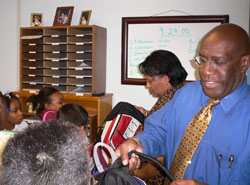Shelter from the Storm
Teachers College alumnus Michael Johnson was working as superintendent of schools for New York City's District 29 (student population: 30,000) when terrorists attacked the World Trade Center on September 11, 2001.
So this past August, when Johnson took over as superintendent in northeast Louisiana's Madison Parish (student population: approximately 3,000) he understandably thought he'd already "been through the final catastrophic event in my life." Then came Katrina.
The storm's direct impact on Madison Parish was minimal compared to the wreckage in places such as New Orleans and Biloxi, Mississippi. As the situation in New Orleans worsened, however, and the mandatory evacuations of many Gulf Coast residents turned into indefinite displacements, Madison Parish and other high-poverty districts provided many evacuees with new homes.
Overall, the Katrina crisis "has not been managed well - it's not a proud moment for our country," Johnson says. "But I'm as proud of our educators now as I was proud of the job we did during 9/11. There's something about educators and the kind of way they respond." As with many rural communities, the school district in Madison Parish is the biggest governmental body and employer, Johnson says. Thus it had the power to act - from allowing evacuees to use computers at teacher-training centers to contact loved ones, to donating old school buildings for housing."The best thing that happened to them was school," Johnson says of the evacuees, most of whom had left behind almost everything they owned and many of whom had owned little to begin with. "I've never seen kids so anxious to go to school before. Schools all look alike, so it was the first time they could say, -'OK, we're home. We know lunch rooms, we know raising our hand, we know taking a seat.'"
Beyond a familiar setting, "We gave kids lunch, bought them clothes, books, and did whatever we needed to do," Johnson says. "We put together after-school programs to minimize the time they had to spend in the shelters." Evacuee teachers were hired to help with the new class load. Parents, too, benefited from having their kids back in school. "Life in a shelter is very rough," Johnson says. "You've been with people 24 hours a day through very rough situations. School gives parents a break. A mother came to me and told me, - 'Now I can cry. I didn't want to do it in front of the kids.'"
Johnson also praises students for holding fund drives and welcoming new classmates: "Some of these kids are the poorest Americans in the country, and they're bringing in food for the evacuees."
Johnson believes that his New York upbringing - he grew up in Harlem, "down the street from Columbia"- has helped him through this crisis. "New York has its own energy, and you don't realize how much that energy influences you. In a place like New York, you sort of have an automatic response to how you take care of children in crisis."
Most rural superintendents have had little experience with homelessness, he adds - whereas back in New York City's District 29, there were so many homeless students that he had to hire a special advocate for them. That experience has served him well in recent weeks - even in dealing with seemingly minor details. One well-intentioned charity, for instance, offered to send a large shipment of clocks. "I said, 'Maybe we don't need clocks,'" Johnson recalls. "I said, 'Send me a backpack full of books for all the kids.' I told them to send cameras, and they thought I was going crazy. But when you've lost everything, you need personal possessions. Things that would seem very small to us, that's what you need to start building again. These families have lost all their pictures, and this is an important thing to them."
Published Tuesday, Oct. 11, 2005
